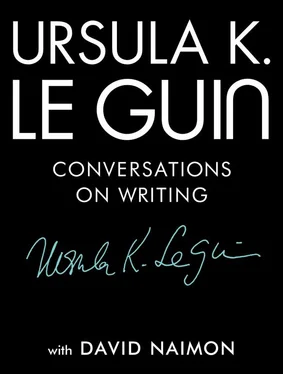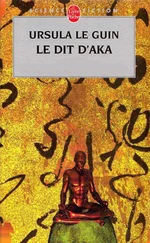Denigration, omission, and exception during a writer’s lifetime are preparations for her disappearance after her death.
UKL:Mary Foote was a novelist and short story writer of no particular literary distinction but some popularity. She wrote some very good stories. Fairly well-known in her own lifetime, which was basically two generations before Wallace Stegner’s. She wrote a very fine autobiography, which was not published during her lifetime. [Note: It was published in 1972 under the silly and misleading title A Victorian Gentlewoman in the Far West .] Stegner was given a copy of this book and some of Foote’s letters by her grandchildren. He took it and built his novel Angle of Repose on it, on her book, her life story. I believe he took even his title from it. It’s a geologist’s term. It’s the angle of a hill at which a rock can come to rest. Beautiful title. And the only credit he gave to Mary Hallock Foote was to thank her grandchildren for the “loan” of their grandmother. He didn’t even name her. I hold this as unforgiveable. I cannot forgive Wallace Stegner, who was very well-known, very popular, very much adored by the intelligentsia, who easily could afford to give credit where credit was due. And he didn’t. I do not forgive.
DN:Back when we were talking about imagining the inner life of your cat, you mentioned some of the possible pitfalls of writing across difference. You participated in a project with Pharos Editions where authors were asked to pick an out-of-print book that they felt particularly deserved to be back in print and you chose a book by Charles L. McNichols called Crazy Weather , a book you read as a teenager and then some seventy years later. It raises some interesting questions about writing across difference too, given that McNichols is white and writing about the Mojave people and their myths. Writing across difference has been a hot topic in the literary world the last couple of years, with Lionel Shriver’s notorious speech asserting her right to do whatever she wants regardless of how it is received, a speech she gave while provocatively wearing a Mexican sombrero, as just the latest part of that ongoing conversation. What are your thoughts on writing across difference, writing as a different race, gender, or otherwise, the risks and potential rewards of it?
UKL:Oh, David, that’s a real can of worms. People have been talking about this for decades now. How far can you speak for a person of a culture not your own? My father was an anthropologist and ran smack into this. When does an attempt to understand become co-optation? This was of course extremely, egregiously visible when white people wrote in the person of Indians, from Fenimore Cooper on. They were co-opting the voice of the Indians, who had no literary voice at that time, but certainly had their own oral literature, their own voice and their own opinions. Those went unheard. They had to be interpreted through the whites. This goes on. Men have been speaking for women for thousands of years, when women had no voice whatsoever, in literature or anywhere else. And that still goes on. But then, okay, if you politicize that to the extent that you say nobody can speak for anybody else, then you get into a mess. Because what we need to say is nobody can speak for anybody who doesn’t have a voice. Of course this is where it gets sticky with animals. Of course, they don’t have a voice. That is their being. They don’t use language as we do. So to what extent can we speak for them? To a very limited extent. On the other hand you don’t have to be like the behavior scientists who say that because we don’t understand their feelings they don’t have any, because we don’t understand how they think they don’t think. Or even to say, as Wittgenstein does, that if a lion could talk we wouldn’t understand him. That’s not necessarily true. But all we can do is imagine our way into the other. And be very, very, very careful at every step, that we are not co-opting that other. Taking it over and putting our voice where we are trying to imagine what its voice is or would be. Eternal vigilance is required.
DN:And you put forth Charles L. McNichol’s Crazy Weather as a relatively successful example of doing this well.
UKL:I did and I was taking a deliberate risk there. I know how the Indians feel about the whites speaking for them and they are absolutely justified in every respect. And yet I picked this book which is a white man writing in the voice of a person who is not an Indian, but a boy who was brought up by the Mojave. I have to assume that to some extent McNichol was. He couldn’t have known it that well otherwise. He just couldn’t have talked from inside that way. And since the book has an introduction by an Indian grandmother, totally approving, I felt like he did it right. He did it carefully, without co-opting. The sense that you are in touch with something really different—completely human and extremely understandable emotionally—but really different. That’s one of the great things novels do.
DN:One of the sections of Words Are My Matter contains your introductions to a variety of different books and also notes on different writers. We learn some interesting facts about you as we read them, for instance, that you and Philip K. Dick went to the same high school at the same time but never knew each other and that you refused your Nebula Award in the 1970s as a protest against the Science Fiction Writers of America revoking Stanislaw Lem’s honorary membership because of Cold War politics. And that the award was then given to Isaac Asimov, a cold warrior.
UKL:Served me right for being self-righteous, I guess.
DN:Among all the writers you engage with in this section, I was hoping we could talk about José Saramago and his importance to you in particular. In this book we get notes about him as a writer and also several book reviews and you say that he is the only novelist of your generation whom you still learn from. Tell us a little about what makes Saramago of such ongoing importance to you.
UKL:It all began with the poet Naomi Replansky, who is now ninety-nine and lives in New York, whom I got to know as a pen pal. Naomi was reading one of Saramago’s novels, Blindness , and told me, “This is great, you’ve got to read this.” So I got a copy, because I obey Naomi, and it scared me to death. I just couldn’t read it. It was so frightening and it was extremely difficult to read because there is no paragraphing and very little punctuation. It is made almost as if to deliberately slow you down. I backed off but I could feel there was something here. So I went and got some more Saramago and put myself through a course on his work. This is all within the last ten or fifteen years, very late in my life. He is not very far ahead of me. He was maybe ten years older than me. He started writing novels very late in his life and he was still writing novels in his seventies and eighties. That’s not only impressive but good news to me. You don’t have to stop. So I invested a lot in Saramago and it paid off for me. He is not an easy writer, partly because of his idiosyncratic punctuation and paragraphing. You just have to allow him that. I still don’t quite understand why he does it but I have to figure that any artist that good knows why he did it. He was very far left, a Marxist, not a devout Marxist, a socialist, always against the dictatorship in his home country, Portugal, and always against the heavy hand of the Catholic Church there. A man of extreme moral sensitivity, and terrific sympathy for all kinds of underdogs, including women and dogs. He won my heart is what happened. Boy, the Nobel committee made a good choice that time—otherwise I never would have heard of him. Most of us wouldn’t have. Being Portuguese is damnation as a writer. It takes a lot to get you out of writing in a “minor” language. Because he was always translated into Spanish, immediately, I think, he might slowly have come to notice. But I’m happy they Nobel-ed him.
Читать дальше









